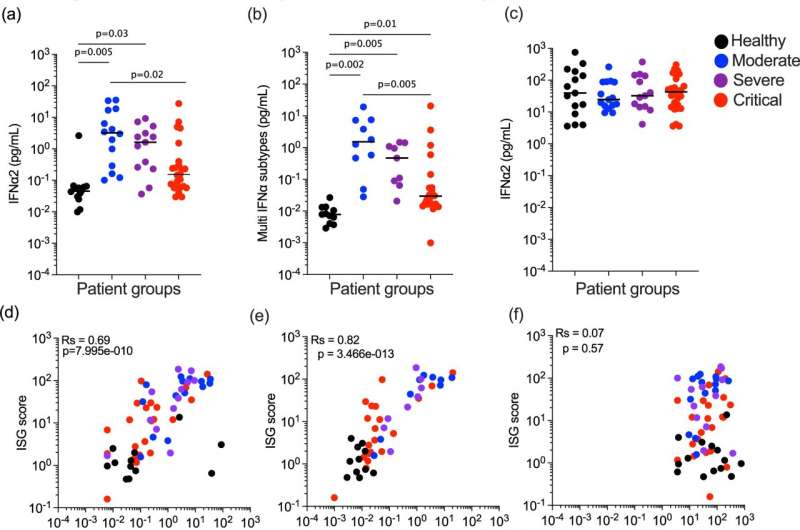Scientists closer to understanding why COVID-19 affects people so differently

Researchers from the Institut Pasteur, Inserm, St. James's Hospital Dublin and Trinity are getting closer to understanding what makes some people so vulnerable to COVID-19-induced illness, which in turn may guide the development of new therapeutic strategies.
Their findings of a comprehensive study that yields fresh insights are published this week in the journal Nature Communications. Chief among their new discoveries is the link between very sick people and their difficulty or inability to produce a key anti-viral protein called type 1 interferon.
Earlier studies, several of which included members of the collaboration, had already shown that if type 1 interferon was compromised then viral infection would not be cleared. But the new work builds on this, and helps explain why simply administering type 1 interferon therapeutically has been largely ineffective.
This most recent French-Irish collaboration found that when type 1 interferon was added to the blood of patients with severe COVID-19, their immune cells were much more inflammatory as compared to people who had a much milder COVID-19.
Darragh Duffy from the Institut Pasteur is the senior investigator on the project. He says, "We have of course long known that people respond very differently to COVID-19—some remain relatively well or are even asymptomatic, while others get very sick and some tragically die. But we are still hunting for a more complete picture of why this the case. This latest research has added more layers to our understanding, and the results are exciting as they may help explain why therapeutic use of type 1 interferon late in infection has failed despite many studies showing how important this protein is in early infection."
The new findings support interferon testing much earlier in the disease time course and reinforce the need to screen individuals with compromised responses (either due to genetics, autoantibodies or treatments) for complications with COVID or other acute viral infections.
Nollaig Bourke, from Trinity, says, "This study reveals important new insights into why inadequate and inappropriate type I interferon responses can be so detrimental in severe COVID-19, which helps us to understand more about the early biological immune processes that go wrong in people with severe disease."
Cliona O'Farrelly, professor of comparative immunology at Trinity, who is based in the Trinity Biomedical Sciences Institute (TBSI), adds, "Novel useful clinical research like this that helps us understand how we are vulnerable to COVID-19 requires teams of people with different skills and expertise like the authors of this paper who come from diverse clinical and scientific backgrounds."
More information: Nikaïa Smith et al, Defective activation and regulation of type I interferon immunity is associated with increasing COVID-19 severity, Nature Communications (2022). DOI: 10.1038/s41467-022-34895-1



















